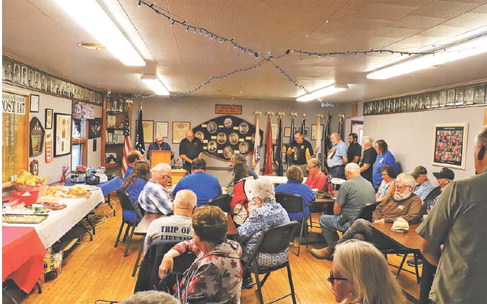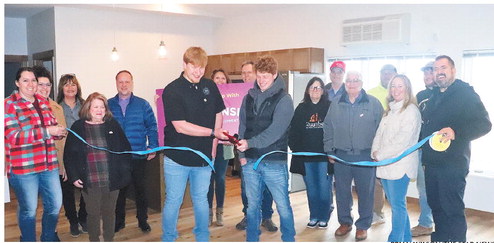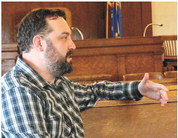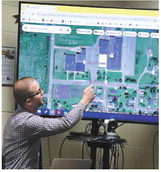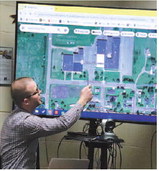Speaking out
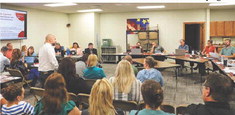

A crowd of more than 20 area residents voiced concerns at Monday’s meeting of the Medford School Board. Many were upset with comments posted online by a teacher following the shooting death of conservative influencer Charlie Kirk on Sept. 11.
Reaction to the post, and to what others believed the post to have said, have been spreading like wildfire over social media since it occurred. Reaction has ranged from people being upset about a teacher expressing their political views to anger over what they perceived to be encouraging acts of violence and has included calls for the teacher’s termination as well as school officials and board members.
According to district administrator Laura Lundy, when concerns were raised, the district conducted an investigation to determine if the posts were made during the school day or while at school. Lundy said it was determined that they were not.
While the district has policies in place that seek to prevent staff members from sharing political or social views with students during the day, Lundy said this does not restrict them from exercising their free speech rights outside of the school day.
Resident Corey Faber said he disagreed with the district’s stand, noting he has been warned by his employer that he could be terminated for posting things on social media.
“There is a difference between public and private em- ployees,” Lundy said, noting that if something is said during the school day, there is a policy for disciplinary action.
Resident Ethan Szydel stated that what was said doesn’t matter at this point, because the teacher was within the rules in posting a comment.
“What our side would like to see is a morality code,” he said, calling for restrictions on teachers sharing any comments of a political nature regardless of when they are said.
Board president Dave Fleegel said the district is on shaky ground when implementing a policy to limit people’s First Amendment rights. “We better make a pretty darn good decision that will legally hold up,” Fleegel said.
Resident Mike Schaaf said that the issue got his attention when elementary students were sent home with surveys asking if they felt safe and that if they did not, people would be assigned to help them. He said there shouldn’t be a need for students to ever feel unsafe. “We all have to figure it out to leave that s### where it belongs and protect and grow the child,” he said.
Matt Damm noted the power of social media and how it was not something that existed when school districts were formed. He said the district is not in a bubble and is not immune to what is going on in the world. He noted the danger of a student picking up on what could be perceived as condoning violence. He said comments like the one posted by the teacher could be seen as giving permission for an act of violence. “It shouldn’t be happening. It especially shouldn’t be happening from the mouth of people who are teaching our children,” he said.
Fleegel emphasized that there are statements that he would see as cause to immediately terminate an employee. He also said they need to have first-hand knowledge and not simply people saying they heard from somebody that someone said something.
Resident Clinton Kraemer raised concern about the influence the teacher could be having on students outside the school day through interactions at his home. He said he is in support of teachers working with students and providing additional instruction outside the school day, but wanted assurance that no views were being shared.
Fleegel responded that if a student’s parents are OK with a student having contact with a teacher outside of school, that is not something the district can control. He repeated that if there are any allegations against any staff members, it should be brought to the district’s attention. However, he also noted that they can’t make accusations without evidence.
Resident Ryan Goessl thanked the school board for taking prompt action in investigating the issue. He urged school board members to proceed with caution in changing policies that could limit speech. “Having opinions is perfectly fine,” Goessl said, noting that teacher gave his opinion on his personal time. He said they are getting into dangerous ground when people face potential punishment for opinions. Goessl said he thinks the school district took appropriate action.
“I disagree with the whole social media freedom of speech, because they are teaching our kids,” Faber said, noting that in this case the discussion was talking about comments related to a murder. “I don’t think they should have a right to make comments,” he said, noting that teachers do have a right to speech, but not when murder is involved. He called for the district to put in place rules that would say teachers would lose their jobs for posting things.
Resident Josh Szydel said it is different with a teacher because it isn’t adults they are talking with, but impressionable children. “They are in a position of authority, a position of respect,” he said.
Fleegel again said there are statements that, if they were made, the board would jump on and end a teacher’s career.
Seidel responded calling on the district to say where that line is drawn and at what point that line is crossed. He said they want to look out for their children. “We can pick their friends, but we can’t pick their teachers unless we homeschool them,” Szydel said.
Board member Don Everhard spoke during the public comments as a district resident and not as board member. He noted that he has a very strong political alignment and voiced concern over attempting to restrict hate speech or any other kind of speech. He said some of the comments he posts could be perceived by some as being hate speech, but that he doesn’t believe he is being hateful in making those comments and would like to extend that luxury to everyone else. “It is really difficult to determine what is hate speech,” he said.
“I do believe it is a very slippery slope,” Everhard said of attempts to restrict speech.
Everhard noted that it is often better if people have filters and use discretion that if something doesn’t help it will likely hinder. He said he often writes long messages and then deletes them instead choosing to follow the principles of loving one another. “If we disagree we should do it in a civil manner,” he said.
Resident Larry Diepenbrock noted that he spent more than two decades in a classroom and said there were times that he wished he had never said anything stupid. He said this situation is where someone screwed up. “I think a heartfelt apology would go a long way,” he said.
While passionate, the more than 45 minutes of public input ended with civility with speakers thanking the district for the opportunity to express their concerns and stating the reminder that the first amendment isn’t just to protect the stuff people like, but to protect the stuff they don’t want to hear.
“I think it is about the kids,” Kraemer said. “We can all agree we want what is best for our children
ALEX WILSON/THE STAR NEWS
in our schools,” Goessl said.
There was no action items on the agenda regarding the issue with the comments. However, there was a closed session that had been added to the meeting last week for personnel discussion with a certified staff member.
Lundy said no action came out of that closed session.
School Statement The following statement was read by school board president Dave Fleegel prior to the start of the public comment period. Copies of the districts policy regarding public comment at meetings and in particular restrictions on making public accusation were posted at the meeting The statement reads as follows: “We want to assure everyone, that the safety, dignity, and well-being of our students remain at the heart of everything we do as a school district. We do not condone violence or hatred in any form, and we are committed to upholding our policies, procedures, and the law to ensure a safe and respectful learning environment for all.
As a public school district, we also recognize and respect that our employees have important rights to freedom of speech and expression under both the U.S. and Wisconsin Constitutions. These rights allow staff to speak as private citizens on matters of public concern, provided they are not speaking on behalf of the district. By law, public school districts may not discipline or retaliate against employees for protected speech. The limited exceptions to this protection include speech that constitutes true threats, incites violence, violates confidentiality, contains defamation, disrupts district operations, or is expressed as part of an employee’s official job duties.
At the same time, we continue to communicate with and support our employees in understanding how their public comments—particularly on social media—can impact relationships with students, families, colleagues, and the community. We expect professionalism.
When circumstances involve personnel matters, we are unable to share specific details. What we can share is every directly reported concern was researched, and investigated. At this time the Medford School District has no substantiated complaints about any staff and their ability to perform in the classroom.”
